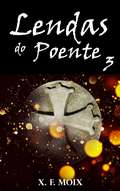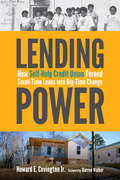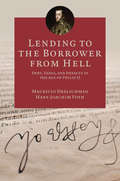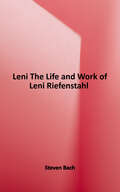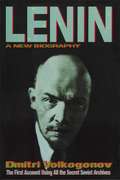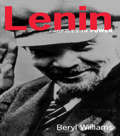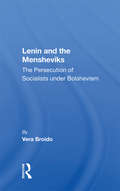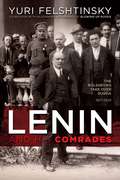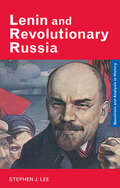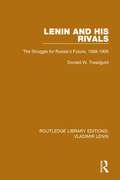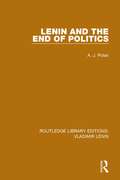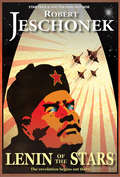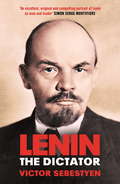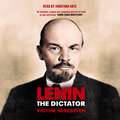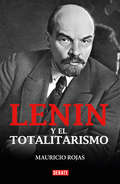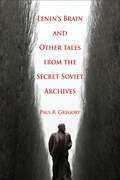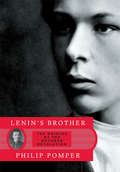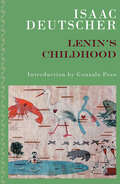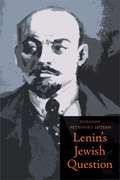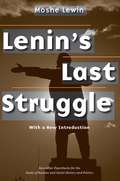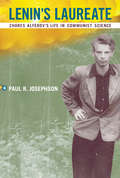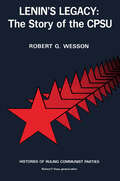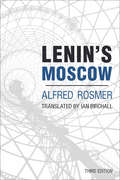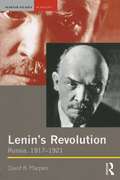- Table View
- List View
Lendas do Poente 3
by X. F. MoixCordilheira de montanhas dos Pirenéus, século dezessete. Um aldeão morre em circunstâncias estranhas. Suspeitando da natureza sobrenatural e maligna do evento, padre Isidro é enviado para investigar o incidente. Porém, existem segredos ainda mais antigos e perigosos ocultos no coração de certas montanhas malditas, relembrados pelos últimos sobreviventes de uma época onde a névoa cobria verdades muito desencorajadoras... Agora este véu foi rasgado, liberando a ameaça. Se nada contê-la, o caos reinará. Chegará a noite onde as fábulas que alimentaram a imaginação de pequenos se tornarão na realidade que aterrorizará até o mais incrédulos dos homens... Quem será capaz de manter a sanidade quando os firmes pilares que sustestam a realidade desmoronam? Magia, bruxaria, e segredos ancestrais irão abalar a ortodoxia do Cristianismo. Uma aventura que nos levará de volta ao profundo dos Pirinéus, em uma terra fronteiriça, onde o impossível se mostra mais real do que o bom senso de muitos desejaria. Será você a desafiá-la, a perseguir seus mais incômodos e arcaicos mistérios? Cada árvore, colina, lago, e caverna pertence a dois mundos; um deles ignorado por nós. Seus proscritos moradores têm alimentado as fantasias do folclore popular... até agora. Adiante, os velhos caminhos que nos conduzem até eles estão traçados, e á sua espera. Viaje através deles, se você tiver a coragem e loucura necessárias.
Lending Power: How Self-Help Credit Union Turned Small-Time Loans into Big-Time Change
by Howard E. Covington Jr. Jr.Established by Martin Eakes and Bonnie Wright in North Carolina in 1980, the nonprofit Center for Community Self-Help has grown from an innovative financial institution dedicated to civil rights into the nation's largest home lender to low- and moderate-income borrowers. Self-Help's first capital campaign—a bake sale that raised a meager seventy-seven dollars for a credit union—may not have done much to fulfill the organization's early goals of promoting worker-owned businesses, but it was a crucial first step toward wielding inclusive lending as a weapon for economic justice. In Lending Power journalist and historian Howard E. Covington Jr. narrates the compelling story of Self-Help's founders and coworkers as they built a progressive and community-oriented financial institution. First established to assist workers displaced by closed furniture and textile mills, Self-Help created a credit union that expanded into providing home loans for those on the margins of the financial market, especially people of color and single mothers. Using its own lending record, Self-Help convinced commercial banks to follow suit, extending its influence well beyond North Carolina. In 1999 its efforts led to the first state law against predatory lending. A decade later, as the Great Recession ravaged the nation's economy, its legislative victories helped influence the Dodd-Frank Wall Street Reform and Consumer Protection Act and the formation of the Consumer Financial Protection Bureau. Self-Help also created a federally chartered credit union to expand to California and later to Illinois and Florida, where it assisted ailing community-based credit unions and financial institutions. Throughout its history, Self-Help has never wavered from its mission to use Dr. Martin Luther King Jr.'s vision of justice to extend economic opportunity to the nation's unbanked and underserved citizens. With nearly two billion dollars in assets, Self-Help also shows that such a model for nonprofits can be financially successful while serving the greater good. At a time when calls for economic justice are growing ever louder, Lending Power shows how hard-working and dedicated people can help improve their communities.
Lending to the Borrower from Hell: Debt, Taxes, and Default in the Age of Philip II (The Princeton Economic History of the Western World #47)
by Mauricio Drelichman Hans-Joachim VothWhat the loans and defaults of a sixteenth-century Spanish king can tell us about sovereign debt todayWhy do lenders time and again loan money to sovereign borrowers who promptly go bankrupt? When can this type of lending work? As the United States and many European nations struggle with mountains of debt, historical precedents can offer valuable insights. Lending to the Borrower from Hell looks at one famous case—the debts and defaults of Philip II of Spain. Ruling over one of the largest and most powerful empires in history, King Philip defaulted four times. Yet he never lost access to capital markets and could borrow again within a year or two of each default. Exploring the shrewd reasoning of the lenders who continued to offer money, Mauricio Drelichman and Hans-Joachim Voth analyze the lessons from this important historical example.Using detailed new evidence collected from sixteenth-century archives, Drelichman and Voth examine the incentives and returns of lenders. They provide powerful evidence that in the right situations, lenders not only survive despite defaults—they thrive. Drelichman and Voth also demonstrate that debt markets cope well, despite massive fluctuations in expenditure and revenue, when lending functions like insurance. The authors unearth unique sixteenth-century loan contracts that offered highly effective risk sharing between the king and his lenders, with payment obligations reduced in bad times.A fascinating story of finance and empire, Lending to the Borrower from Hell offers an intelligent model for keeping economies safe in times of sovereign debt crises and defaults.
Leni: The Life and Work of Leni Riefenstahl
by Steven BachLeni Riefenstahl, the woman known as “Hitler’s filmmaker,” made some of the greatest and most innovative documentaries ever made. They are also insidious glorifications of Adolf Hitler and the Third Reich. Now, Steven Bach reveals the truths and lies behind Riefenstahl’s lifelong self-vindication as an apolitical artist who claimed to know nothing of the Holocaust and denied her complicity with the criminal regime she both used and sanctified. <p><p>A riveting and illuminating biography of one of the most fascinating and controversial personalities of the twentieth century.
Lenin
by Dmitri VolkogonovThe special assistant to Boris Yeltsin radically alters the traditional image of Lenin with a biography based on secret Soviet archives, revealing the Founding Father as a cruel, totalitarian leader who was responsible for the worst excesses of the Soviet state.
Lenin (Profiles In Power)
by Beryl WilliamsDrawing on the flood of new material to emerge from Russian and Western sources in recent years, Beryl Williams focuses on Lenin's years in power and provides first-rate introduction to the life, ideology and impact of one of the formative figures of the 20th-century. Within an overall chronological framework, Williams examines topics such as cultural revolution, foreign policy and expansion. As well as being an examination of Lenin’s life and work, this is an up-to-date evaluation of recent historiographical debates and literature in the context of the period.
Lenin And The Mensheviks: The Persecution Of Socialists Under Bolshevism
by Vera BroidoThis book focuses on the persecution of the Mensheviks and other Russian socialists and Anarchists, whose fate was much the same. It is about the years of wars and upheavals, the enforced migrations and how the Mensheviks had managed to keep a social community and a political culture in being.
Lenin and His Comrades
by Yuri FelshtinskyWhat was the real impact and significance of the October Revolution of 1917? This avowedly revisionist interpretation by a major Russian dissident seeks to place Lenin and those around him in the proper perspective. Since the takeover of Russia was the result of a coup d'état by a tiny minority of criminals that Yuri Felshtinsky doesn't hesitate to call gangsters, the Communist regime was doomed from the start.Yuri Felshtinsky received a PhD in history from Rutgers University. His books include The Failure of the World Revolution (1991), Blowing up Russia (with Alexander Litvinenko, 2007), and The Corporation: Russia and the KGB in the Age of President Putin (with Vladimir Pribylovsky, 2008). He lives near Boston, Massachusetts.
Lenin and Revolutionary Russia (Questions and Analysis in History)
by Stephen J. LeeLenin and Revolutionary Russia examines the background to and the course of the Russian Revolution of 1917 and Lenin's regime. It explores all the key aspects such as the development of the Bolsheviks as a revolutionary party, the 1905 Revolution, the collapse of the Tsarists, the Russian Civil War and historical interpretations of Lenin's legacy to Russian history.
Lenin and his Rivals: The Struggle for Russia's Future, 1898-1906 (Routledge Library Editions: Vladimir Lenin #6)
by Donald W. TreadgoldOriginally published in 1955, this is an illuminating study of the political thought and action of the Russian intelligentsia, in the decade up to and including the Revolution of 1905-6. It is based on the writings, including those in the revolutionary press, by which the chief figures of the main opposition parties expressed their political theory, strategy and tactics and related them to the turbulent events of those years. It is also based on personal interviews with some of the survivors of these political struggles. The book is focused on the emergence, starting in 1889 of the major political parties in Russia and it tells of their efforts to form a common front against Tsarism in the revolution which they confidently expected in the early years of the century.
Lenin and the End of Politics (Routledge Library Editions: Vladimir Lenin #2)
by A. J. PolanOriginally published in 1984 this book reconsiders the effect of Lenin on the politics and culture of the 20th Century. In a detailed examination of Lenin's famous text, The State and Revolution, the author argues that the peculiar status of this work presents readers with major problems of interpretation and shows how a failure to identify these problems has prevented an adequate understanding of important issues in modern politics, history and social theory. The book compares Lenin's 'radical utopia' with the ideas of politics offered by other theorists, centrally Weber and Sartre, but also writers such as Jefferson and Habermas. This original approach shows the impact of Lenin's text on political history and theory and leads to a new understanding of the connection between revolution and violence, social change and authoritarianism.
Lenin of the Stars
by Robert T. Jeschonek Ben BaldwinLenin came from outer space! He and his fellow shape-changing aliens bring communism to Earth, hoping to teach galactic harmony to violent humanity. Communist aliens posing as legendary leaders steer great nations through the turbulent history of the Twentieth Century. But changing times and surprising turnarounds lead the aliens to fight a secret civil war among their own ranks. When the alien Lenin and his beloved Irina end up on opposite sides, they have no choice but to battle to the death...or start a new revolution that might just sweep the stars. Don't miss this exciting tale by award-winning storyteller Robert T. Jeschonek, a master of unique and unexpected science fiction that really packs a punch.
Lenin the Dictator
by Victor Sebestyen'A fresh, powerful portrait of Lenin' Anne Applebaum, author of Red Famine'Richly readable ... An enthralling but appalling story' Francis Wheen, author of Karl MarxThe cold, one-dimensional figure of Lenin the political fanatic is only a partial truth. Drawing on extensive material that has only recently become available, Sebestyen's gripping biography casts an intriguing new light on the character behind the politics.In reality, Lenin was a man who loved nature as much as he loved making revolution, and his closest relationships were with women. He built a state based on terror. But he was a highly emotional man given to furious rages and deep passions. While never ignoring the politics, Sebestyen examines Lenin's inner life, his relationship with his wife and his long love affair with Inessa Armand, the most romantic and beguiling of Bolsheviks. These two women were as significant as the men - Stalin or Trotsky - who created the world's first Communist state with him.
Lenin the Dictator
by Victor SebestyenVictor Sebestyen's intimate biography is the first major work in English for nearly two decades on one of the most significant figures of the twentieth century. In Russia to this day Lenin inspires adulation. Everywhere, he continues to fascinate as a man who made history, and who created a new kind of state that would later be imitated by nearly half the countries in the world.Lenin believed that the 'the political is the personal', and while in no way ignoring his political life, Sebestyen's focus will be on Lenin the man - a man who loved nature almost as much as he loved making revolution, and whose closest ties and friendships were with women. The long-suppressed story of his ménage a trois with his wife, Nadezhda Krupskaya, and his mistress and comrade, Inessa Armand, reveals a different character to the coldly one-dimensional figure of legend.Told through the prism of Lenin's key relationships, Sebestyen's lively biography casts a new light the Russian Revolution, one of the great turning points of modern history.Read by Jonathan Aris(p) 2017 Orion Publishing Group Ltd
Lenin the Dictator: The Man, The Dictator, And The Master Of Terror
by Victor Sebestyen'A fresh, powerful portrait of Lenin' Anne Applebaum, author of Red Famine'Richly readable ... An enthralling but appalling story' Francis Wheen, author of Karl MarxThe cold, one-dimensional figure of Lenin the political fanatic is only a partial truth. Drawing on extensive material that has only recently become available, Sebestyen's gripping biography casts an intriguing new light on the character behind the politics.In reality, Lenin was a man who loved nature as much as he loved making revolution, and his closest relationships were with women. He built a state based on terror. But he was a highly emotional man given to furious rages and deep passions. While never ignoring the politics, Sebestyen examines Lenin's inner life, his relationship with his wife and his long love affair with Inessa Armand, the most romantic and beguiling of Bolsheviks. These two women were as significant as the men - Stalin or Trotsky - who created the world's first Communist state with him.
Lenin y el totalitarismo
by Mauricio RojasAl conmemorarse el centenario de la Revolución rusa, Mauricio Rojas presenta un polémico y agudo perfil sobre Lenin A partir de una reflexión histórica sobre la situación política y social en Rusia desde finales del siglo XIX y principios del XX, el autor describe la creación y auge del partido bolchevique y, principalmente, lo que denomina "contrarrevolución de octubre", es decir, el paso del ideal revolucionario iniciado con los sóviets al terror contra el pueblo ruso. De esta manera, Rojas explica y describe el sistema totalitario bajo el régimen de Lenin y Stalin, centrándose en el "Gran Terror" que azotó al pueblo ruso durante gran parte del siglo XX. Con un relevante análisis de textos escritos de puño y letra por el líder de la Revolución rusa, la propuesta presentada en este ensayo, que expone las contradicciones y brutalidades realizadas durante décadas en nombre de la utopía comunista, interpela al lector invitándolo a pensar de otro modo la importancia de este momento crucial en la historia de la humanidad.
Lenin's Brain and Other Tales from the Secret Soviet Archives
by Paul R. GregoryAn enlightening look into the once-secret Soviet state and party archives that Western scholars first gained access to in the early 1990s. Paul Gregory breaks down a decades-old wall of secrecy to reveal intriguing new information on such subjects as Stalin's Great Terror, the day-to-day life of Gulag guards, the Soviet invasion of Afghanistan, the scientific study of Lenin's brain, and other fascinating tales.
Lenin's Brother: The Origins of the October Revolution
by Philip PomperThe gripping untold story of a terrorist leader whose death would catapult his brother--Lenin--to revolution. In 1886, Alexander Ulyanov, a brilliant biology student, joined a small group of students at St. Petersburg University to plot the assassination of Russia's tsar. Known as "Second First March" for the date of their action, this group failed disastrously in their mission, and its leaders, Alexander included, were executed. History has largely forgotten Alexander, but for the most important consequence of his execution: his younger brother, Vladimir, went on to lead the October Revolution of 1917 and head the new Soviet government under his revolutionary pseudonym "Lenin." Probing the Ulyanov family archives, historian Philip Pomper uncovers Alexander's transformation from ascetic student to terrorist, and the impact his fate had on Lenin. Vividly portraying the psychological dynamics of a family that would change history, Lenin's Brother is a perspective-changing glimpse into Lenin's formative years--and his subsequent behavior as a revolutionary.
Lenin's Childhood
by Isaac DeutscherWhen he died suddenly in 1967, Isaac Deutscher had completed only the compelling first chapter of a long-anticipated biography of Lenin, published here. It covers Lenin&’s family background, birth and early years in the backwater town of Simbirsk up to the execution of his brother, a traumatic formative event. Drawing on a lifetime of background research, including access to the closed section of Trotsky&’s archives, Lenin&’s Childhood gives a novel interpretation of the earliest influences on Lenin&’s personality and thinking. Most of all, it is a glimpse into an unfinished work which would have striven to save Lenin from fanatical anti-revolutionary condemnation and, perhaps more important, from uncritical communist beatification.This anniversary edition includes an introduction by Deutscher's biographer, Gonzalo Pozo, which situates the Lenin project within Deutscher&’s oeuvre and discusses the sources, influences and evolution of his never completed life of Lenin.
Lenin's Jewish Question
by Yohanan Petrovsky-ShternIn this first examination of Lenin’s genealogical and political connections to East European Jews, Yohanan Petrovsky-Shtern reveals the broad cultural meanings of indisputable evidence that Lenin’s maternal grandfather was a Jew. He examines why and how Lenin’s Jewish relatives converted to Christianity, explains how Lenin’s vision of Russian Marxism shaped his identity, and explores Lenin’s treatment of party colleagues of Jewish origin and the Jewish Question in Europe. Petrovsky-Shtern also uncovers the continuous efforts of the Soviet communists to suppress Lenin’s Jewishness and the no less persistent attempts of Russian extremists to portray Lenin as a Jew. In this fascinating book, Petrovsky-Shtern expands our understanding not only of Lenin, but also of Russian and Soviet handling of the Jewish Question.
Lenin's Last Struggle
by Moshe LewinOne of the great political strategists of his era, V. I. Lenin continues to attract historical interest, yet his complex personality eludes full understanding. This new edition of Moshe Lewin's classic political biography, including an afterword by the author, suggests new approaches for studying the Marxist visionary and founder of the Soviet state. Lenin's Last Struggle offers invaluable insights into the rise of the Bolshevik party and the Soviet Union, a saga complicated by complex strategic battles among the leaders of Lenin's generation: leaders whose names are universally known, but whose personalities and motivations are even now not sufficiently understood.
Lenin's Laureate: Zhores Alferov's Life in Communist Science (Transformations: Studies in the History of Science and Technology)
by Paul R. JosephsonThe life and work of a leading Soviet physicist and an exploration of the strengths and weaknesses of Soviet science from Stalin through Gorbachev.In 2000, Russian scientist Zhores Alferov shared the Nobel Prize for Physics for his discovery of the heterojunction, a semiconductor device the practical applications of which include LEDs, rapid transistors, and the microchip. The Prize was the culmination of a career in Soviet science that spanned the eras of Stalin, Khrushchev, and Gorbachev—and continues today in the postcommunist Russia of Putin and Medvedev. In Lenin's Laureate, historian Paul Josephson tells the story of Alferov's life and work and examines the bureaucratic, economic, and ideological obstacles to doing state-sponsored scientific research in the Soviet Union. Lenin and the Bolsheviks built strong institutions for scientific research, rectifying years of neglect under the Czars. Later generations of scientists, including Alferov and his colleagues, reaped the benefits, achieving important breakthroughs: the first nuclear reactor for civilian energy, an early fusion device, and, of course, the Sputnik satellite. Josephson's account of Alferov's career reveals the strengths and weaknesses of Soviet science—a schizophrenic environment of cutting-edge research and political interference. Alferov, born into a family of Communist loyalists, joined the party in 1967. He supported Gorbachev's reforms in the 1980s, but later became frustrated by the recession-plagued postcommunist state's failure to fund scientific research adequately. An elected member of the Russian parliament since 1995, he uses his prestige as a Nobel laureate to protect Russian science from further cutbacks.Drawing on extensive archival research and the author's own discussions with Alferov, Lenin's Laureate offers a unique account of Soviet science, presented against the backdrop of the USSR's turbulent history from the revolution through perestroika.
Lenin's Legacy
by Robert WessonThis concise monograph traces Russian Marxism from its beginnings to mid-1977, shows how and why the party achieved power, how it has strengthened its position, and how it has undertaken to remold the country and to solve its internal problems. Wesson's study is the only up-to-date party history currently available. The book opens with background material on Russian discontent and endeavors to analyze the fundamental nature of Communist Party rule, taking into account new perspectives in Lenin's revolution, the Stalinist period, and the Khrushchev years, as well as the latest period not covered in earlier accounts. It treats the rise of Lenin, the struggle for power after Lenin and after Stalin, and the consolidation of Brezhnev's authority. As the most recent history of communism in the Soviet Union, it has great topical interest and is clearly written for the benefit of the student and general reader as well as the professional.
Lenin's Moscow
by Alfred Rosmer Ian BirchallWhen Alfred Rosmer arrived in Russia in 1919 it was considered by millions to be the center of world revolution. It was also a society beleaguered by civil war and encircled by hostile powers seeking to snuff out the promise and potential the first successful workers' revolution represented. It was in this context that revolutionaries from across the globe undertook the creation of the Communist International, hoping to forge an instrument to fan the flames of the struggle against global capitalism.In this gripping political memoir of his time in Moscow, Rosmer draws on his unique perspective as both a delegate to the Comintern-and as a member of its Executive Committee-to paint a stunning and inspiring picture of the early years of Soviet rule. From the debates sparked by the publication of Lenin's State and Revolution and Left-Wing Communism to the efforts of the International to extend its influence beyond Europe with the Congress of the Peoples of the East in Baku, Rosmer documents key developments with an unparalleled clarity of vision and offers invaluable insights.
Lenin's Revolution: Russia, 1917-1921 (Seminar Studies)
by David R. MarplesThis study examines one of the key events in history, the Russian Revolution. Since the late Gorbachev period, a wealth of new material has become available to historians that has triggered intense scholarly debate on the nature of revolution. This timely new book takes account of the new scholarship, including - for example - the role of Lenin. It is argued that the intial flexibility of Lenin and the Bolshevik party allowed them to take power, but that the conduct of both changed considerably once they were obliged to take steps to maintain their authority. This book charts the Febuary Revolution, the October Revolution, the Civil War and the main individuals involved, giving a remarkable degree of clarity to the tumultuous events in Russia whose consequences the world lived with for the rest of the twentieth century.
